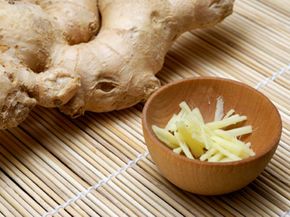Ginger is another well-documented home remedy for stomach disorders and is a good choice to treat upset stomach.
How Ginger Works
Ginger appears to reduce inflammation in a similar way to nonsteroidal anti-inflammatory drugs (NSAIDs), such as aspirin and ibuprofen; it slows associated biochemical pathways. Ginger is also a mild stimulant that promotes circulation.
Advertisement
Ginger's root contains chemicals called gingerols and shogaols. When using ginger to treat upset stomach, these chemicals relax the intestinal tract, preventing motion sickness and relieving the nausea, vomiting, colicky stomach cramps, and diarrhea that often accompany stomach flu.
Ginger and Motion Sickness
This herb has been studied as a remedy for motion sickness. The British medical journal Lancet, for example, reported in 1982 that ginger is a "very effective" motion sickness medicine.
Several studies show that two or three ginger capsules taken one half hour before a trip and two to three capsules taken at one to two hour intervals during a trip are effective in preventing motion sickness.
Nausea that is caused by motion sickness is a complex reaction involving various areas of the brain as well as the digestive tract. Although it's unclear exactly how ginger works, it appears to act directly on both the stomach and the brain. For that reason, ginger may be used to relieve dozens of ailments, including any form of nausea, gas, heartburn, flatulence, diarrhea, and vertigo (dizziness).
Ginger and Morning Sickness
The Lancet journal article also recommends ginger capsules, ginger tea, or ginger ale for morning sickness associated with pregnancy. And a few conventional physicians are prescribing ginger for patients who become nauseated after having cancer chemotherapy treatments or after undergoing surgery.
A survey of studies that looked at the benefits of ginger in relieving pregnancy- and surgery-induced nausea found patients got significant relief with almost no side effects.
Ginger has demonstrated a success rate of 75 percent in curing morning sickness and stomach flu. Research in animals suggests that extracts of fresh ginger may inhibit gastric secretions and perhaps play a role in preventing some gastric ulcers.
A bout of indigestion or stomach flu is certainly not enjoyable, but with these home remedies in your arsenal, your unpleasant experience should be easily treated and short-lived.
This information is solely for informational purposes. IT IS NOT INTENDED TO PROVIDE MEDICAL ADVICE. Neither the Editors of Consumer Guide (R), Publications International, Ltd., the author nor publisher take responsibility for any possible consequences from any treatment, procedure, exercise, dietary modification, action or application of medication which results from reading or following the information contained in this information. The publication of this information does not constitute the practice of medicine, and this information does not replace the advice of your physician or other health care provider. Before undertaking any course of treatment, the reader must seek the advice of their physician or other health care provider.
Advertisement

